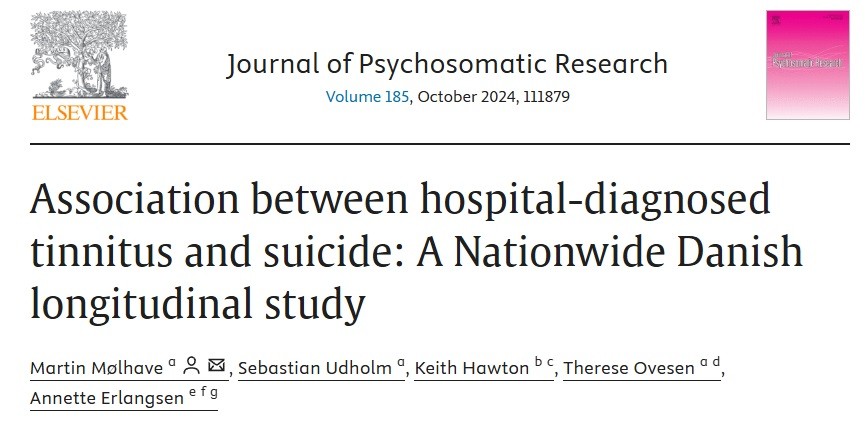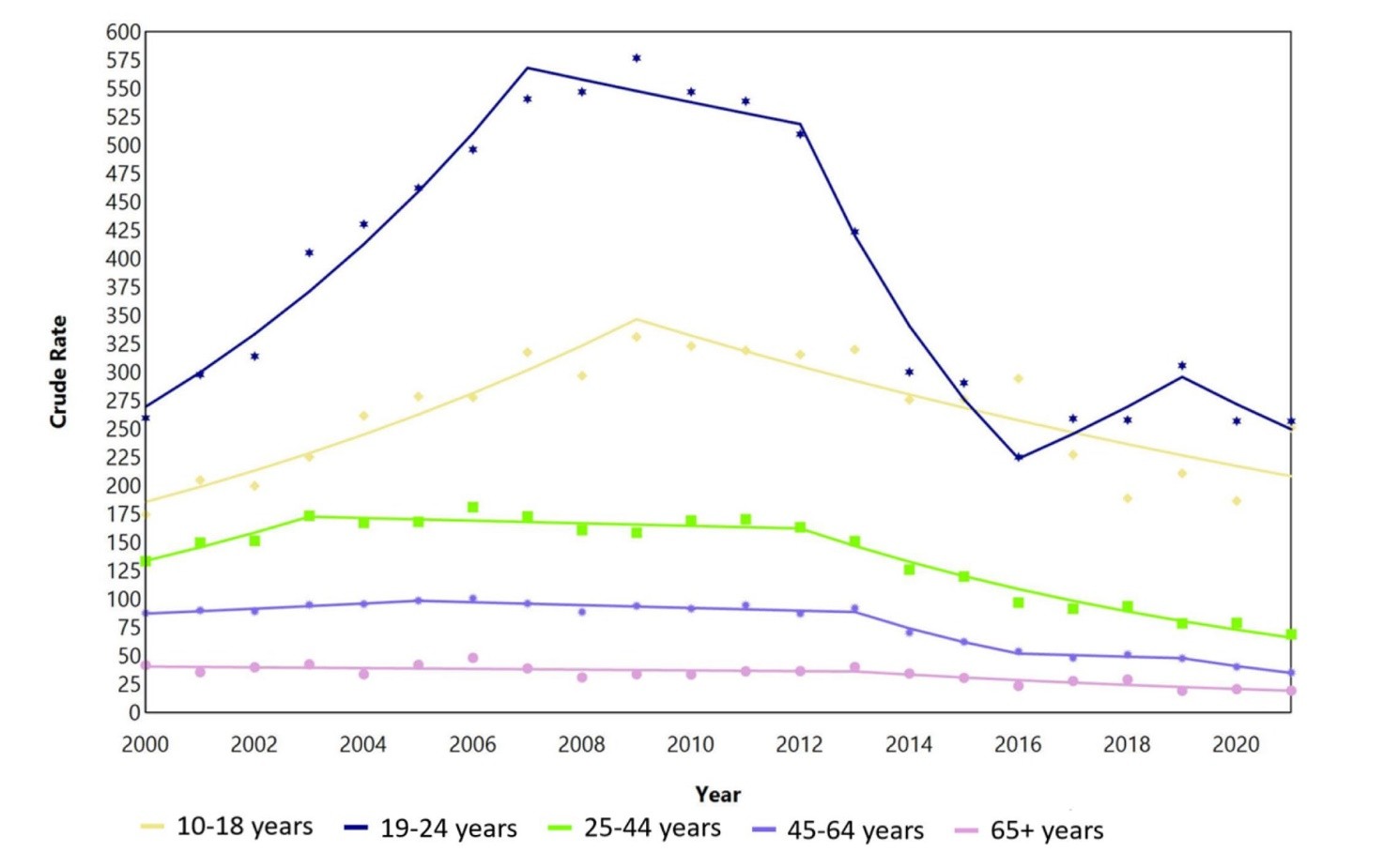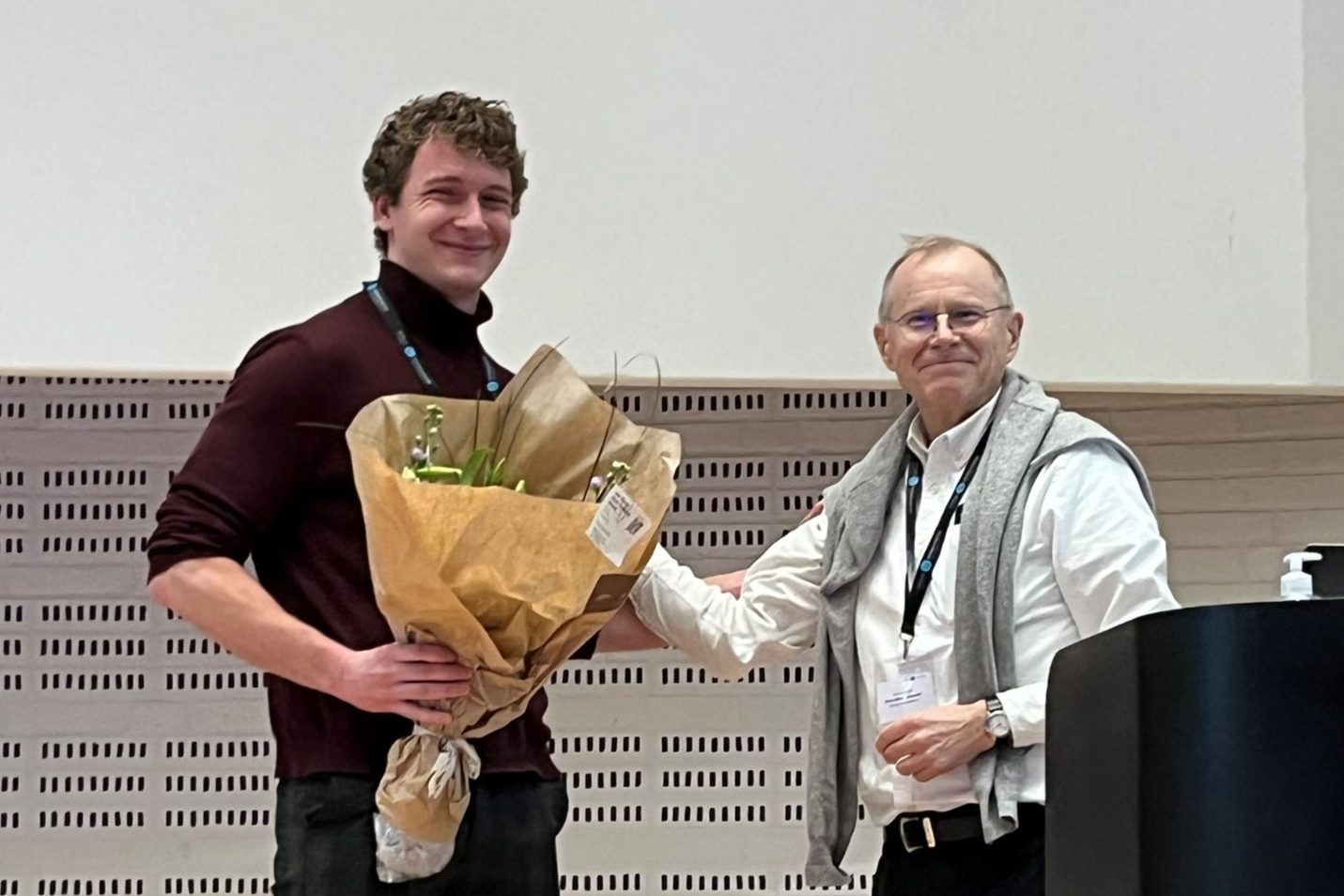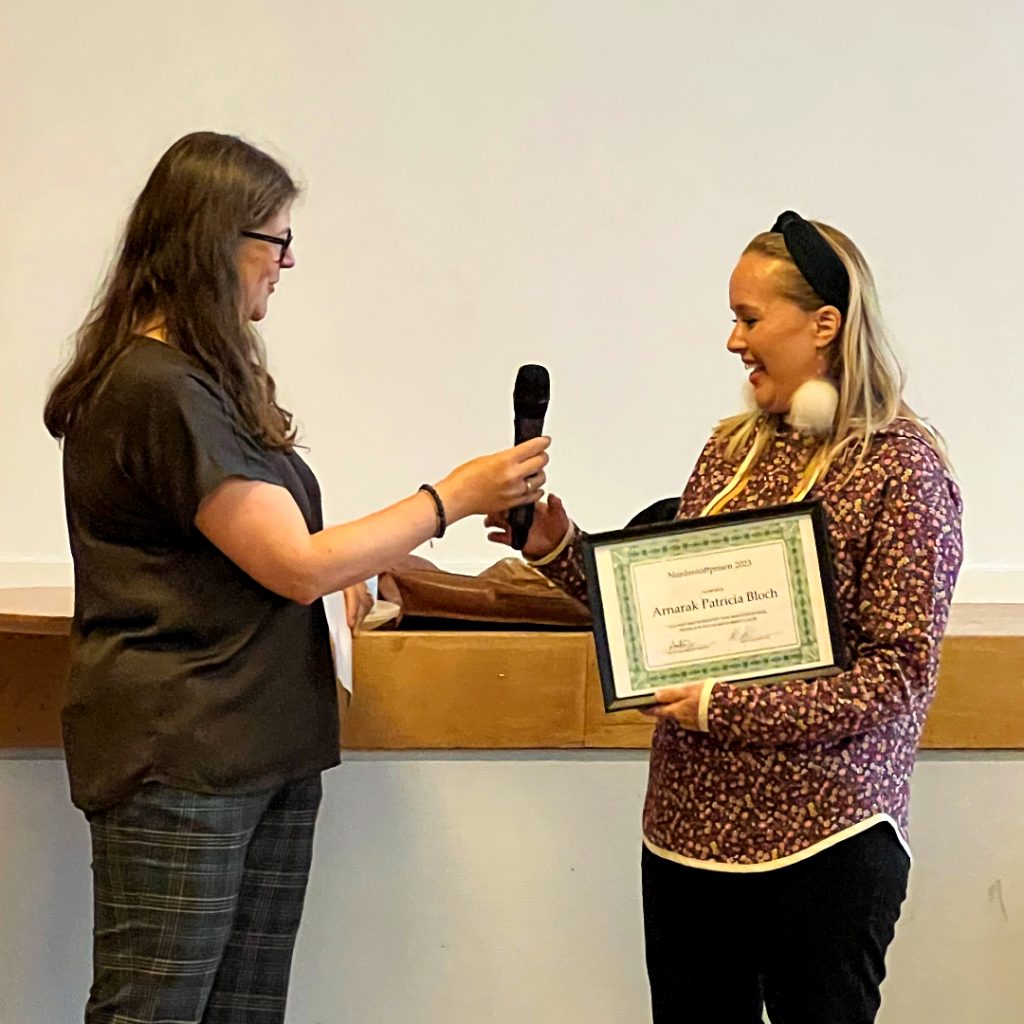Individuals Diagnosed with Tinnitus have elevated rates of suicide
People with a hospital-diagnosed tinnitus have a 40% higher suicide rate when compared to those without a such diagnosis. This is the finding of a new study conducted in Denmark and highlights the critical need for awareness and support for patients who are challenged by their tinnitus. Read more here

Fewer suicide attempts among young people
Suicidal behavior is a public health issue. The high rates of suicide attempts, particularly among young people and women, require ongoing monitoring of trends. Britt Reuter Morthorst from DRISP has recently completed an examination of the trends of suicide attempts by gender and age in Denmark during the period 2000–2021. Read more here

Website for parents of children with
suicide attempt
In collaboration with people with lived experiences, DRISP has developed a website with support and information for parents of children with suicide attempts. Read more here

Suicidal thought among Danish adolescents
Up to one-third of Danish adolescents have experienced suicidal thoughts. This was shown in a study from DRISP, which has recently been published in European Child and Adolescent Psychiatry. Read more here

Nikolaj Kjær Høier wins awards for assignment and presentation
Research assistant and medical student, Nikolaj Kjær Høier won the 2nd prize in the competition for the Danish Region’s Award for Medical Students in Clinical Psychiatry as well as a Poster Award at the recent international conference for suicide prevention in Bangkok, Thailand. Read more here

Denmark has a national plan for suicide prevention
Health minister Sofie Løhde recently announced that the government has passed a bill for a national action plan for suicide prevention. The plan is part of the larger 10-year plan for psychiatric care. Read more

Nordic Council of Ministers
DRISP was tasked by the Nordic Council of Ministers with conducting a status report on suicide prevention in the Nordic countries. The results of this analysis now show, among other things, that most Nordic countries have a national action plan for suicide prevention, but there are still shortcomings in suicide prevention. For example, very few countries systematically monitor the number of suicide attempts. It is also rare for individuals who have attempted suicide to be offered follow-up after presenting at the emergency room. The report can be read in its entirety on our website, where other key points are also mentioned here.
Read more here
DRISP is launching the FORSAM database
FORSAM stands for “Prevention of Suicidal Actions through Monitoring.” FORSAM is an online monitoring portal for suicide prevention, which has recently been developed by DRISP. The website presents data on suicides and suicide attempts for various risk groups. The latest available data is available at the municipality, healthcare cluster, regional, and national levels.
The idea behind FORSAM is to create an easily accessible monitoring portal where stakeholders in suicide prevention can easily find information, for instance to questions, such as:
- What is the profile in terms of gender, age, marital status, household conditions, socioeconomic status, education, mental illnesses, chronic illnesses of individuals who die by suicide in a specific municipality?
- What is the suicide rate among individuals with mental illnesses?
- How many of the individuals who die by suicide in the catchment area of a specific hospital have received psychiatric treatment within the last 6 months?
You can find FORSAM here.
The 2023 Nordentoftprize is awarded to Arnârak Patricia Bloch

The Nordentoft Prize 2023 is awarded to Arnârak Patricia Bloch for her tireless work in recent years in educating and informing healthcare professionals about suicide prevention in Greenland. The award will be presented at the National Network Day for Suicide Preventive Clinicians in Denmark on November 2, 2023.
you can read more about the prize recepient and the prize here
The 2023 Papageno Prize is awarded to composer and artist Frans Bak
The Papageno Prize of 2023 goes to composer Frans Bak for his unique concept for survivors of suicide: “Songs for My Mother – Songs of Grief and Love After Suicide.” The award will be presented in connection with World Suicide Prevention Day on September 8, 2023, in Hillerød.
you can read more about the prize recepient and the prize here
Paracetamol-project (Danish Pack size restriction)
Paracetamol is reported to be the most frequently used drug for overdoses in Europe. Studies have shown that smaller pack sizes of analgesics can reduce numbers of poisonings. Recent legislative measures in Denmark included an age and pack size restriction on weak analgesics. This inspired Britt Morthorst from DRISP to conduct an evaluation of the effect of these interventions. The findings from the recently published findings show that a significant reduction in trends of poisoning by non-opioid analgesics treated in hospitals and fewer severe poisonings was observed after the legislative changes in Denmark. Read more about the study here
Suicide among persons in same- sex and opposite-sex marriages in Denmark and Sweden
DRISP found that people in same-sex marriages have a 1.5-fold higher suicide rate when compared to people living in opposite-sex marries. Over the periods 1989-2002 and 2003-16, the rate of suicides among people in same-sex unions fell by 46%, compared to a decline of about 28% in the number of suicides by people in heterosexual relationships. Read more about the study here

Imprisoned in Nordic countries have a 8-fold higher suicide rate
In collaboration with Nordic research teams, DRISP has recently published an international scientific study, which shows that people in prison have an 8-fold higher suicide rate than found in the general population. The findings, furthermore, reveal a decline in the suicide rate of people in prison over the 17-year study period. This decline was steeper that the decline in the suicide rate of the general population the Nordic countries during the same period.
Read more about the study here
Science: Suicide—turning the tide
A recent issue of the highly recognised journal, SCIENCE, was dedicated to suicide prevention and the Editors of Science asked DRISP to comment upon the historic decline in the Danish suicide rate, which was observed during 1980-2007. In addition, a series of articles in the issue describes the current state of suicide prevention. Read more here
Neurological disorders and suicide
DRISP examined whether people with specific neurological disorders die by suicide more often than other people. The study was based on the register data covering the entire population of Denmark during 1980-2016.
The findings from the study, which was published in JAMA,
Traumatic brain injury (TBI) and risk of suicidal behaviour
DRISP found that the risk of suicide is almost twice as high in people who experienced a TBI compared with people who had no TBI records. The risk was especially high in the first period after the TBI incident and oncreased by number of experienced TBI’s. Read more about the study here

